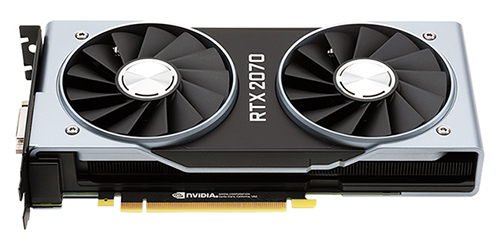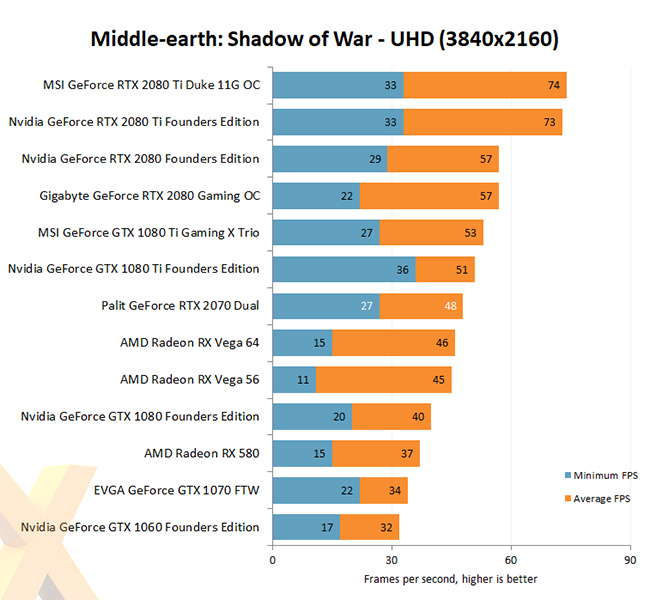Our Aim
To provide you with an overview on New And existing technologies, hopefully helping you understand the changes in the technology. Together with the overviews we hope to bring topical issues to light from a series of independent reviewers saving you the time And hassle of fact finding over the web.
We will over time provide you with quality content which you can browse and subscribe to at your leisure.
TekSpek 's

NVIDIA GeForce RTX 2070
Date issued:

NVIDIA has come to the premium PC graphics card party of 2018 heavily armed with its new architecture known as Turing. It is this silicon blueprint that powers the all-new GeForce RTX 2080 Ti and RTX 2080 that have been available for about a month now.
Impressive performance in today's games is augmented by a forward-looking design that bets big on raytracing and machine learning. Using all of Turing goodies - more shaders, faster memory, RT cores for raytracing, Tensor Cores for machine learning - can make the headline RTX 2080 Ti 2x as fast as the GeForce GTX 1080 Ti. That's a handy jump in a generation.
Yet while most hanker after the fastest card around, NVIDIA and its partners know that RTX goodness needs to be distilled further down the pack for it become accepted into the mainstream gamer's psyche. Helping matters along in this regard is the GeForce RTX 2070, released on October 16, and available for under £500. Let's take a closer look at what makes it tick.
| GeForce: from GTX to RTX | ||||||
|---|---|---|---|---|---|---|
| RTX 2080 Ti | GTX 1080 Ti | RTX 2080 | GTX 1080 | RTX 2070 | GTX 1070 | |
| Launch date | Sep 2018 | Mar 2017 | Sep 2018 | May 2016 | Oct 2018 | May 2016 |
| Codename | TU102 | GP102 | TU104 | GP104 | TU106 | GP104 |
| Architecture | Turing | Pascal | Turing | Pascal | Turing | Pascal |
| Process (nm) | 12 | 16 | 12 | 16 | 12 | 16 |
| Transistors (bn) | 18.6 | 12 | 13.6 | 7.2 | 10.8 | 7.2 |
| Die Size (mm²) | 754 | 471 | 545 | 314 | 445 | 314 |
| Base Clock (MHz) | 1,350 | 1,480 | 1,515 | 1,607 | 1,410 | 1,506 |
| Boost Clock (MHz) | 1,545 | 1,582 | 1,710 | 1,733 | 1,620 | 1,683 |
| Founders Edition Clock (MHz) | 1,635 | - | 1,800 | - | 1,710 | - |
| Shaders | 4,352 | 3,584 | 2,944 | 2,560 | 2,304 | 1,920 |
| GFLOPS | 13,448 | 11,340 | 10,068 | 8,873 | 7,465 | 6,463 |
| Founders Edition GFLOPS | 14,231 | - | 10,598 | - | 7,880 | - |
| Tensor Cores | 544 | - | 368 | - | 288 | - |
| RT Cores | 68 | - | 46 | - | 36 | - |
| Memory Size | 11GB | 11GB | 8GB | 8GB | 8GB | 8GB |
| Memory Bus | 352-bit | 352-bit | 256-bit | 256-bit | 256-bit | 256-bit |
| Memory Type | GDDR6 | GDDR5X | GDDR6 | GDDR5X | GDDR6 | GDDR5 |
| Memory Clock | 14Gbps | 11Gbps | 14Gbps | 10Gbps | 14Gbps | 8Gbps |
| Memory Bandwidth | 616 | 484 | 448 | 320 | 448 | 256 |
| ROPs | 88 | 88 | 64 | 64 | 64 | 64 |
| Texture Units | 272 | 224 | 184 | 160 | 144 | 120 |
| L2 cache (KB) | 5,632 | 2,816 | 4,096 | 2,048 | 4,096 | 2,048 |
| Power Connector | 8-pin + 8-pin | 8-pin + 6-pin | 8-pin + 6-pin | 8-pin | 8-pin | 8-pin |
| TDP (watts) | 250 | 250 | 215 | 180 | 175 | 150 |
| Founders Edition TDP (watts) | 260 | - | 225 | - | 185 | - |
| Suggested MSRP | $999 | $699 | $699 | $549 | $499 | $379 |
| Founders Edition MSRP | $1,199 | $699 | $799 | $699 | $599 | $449 |
Though now the third tier card in the new range, GeForce RTX 2070 is no shrinking violet, and it carries a formidable specification in its own right. It has substantially more horsepower than the popular GeForce GTX 1070, with a total of 2,304 shaders and 144 texture units. All good, but the clear improvement over the last generation arrives with NVIDIA continuing to use super-fast 14Gbps GDDR6 memory which offers a whopping 75 per cent more bandwidth than the GTX 1070... and that's not factoring in a number of advanced technologies which, in truth, effectively combine to double the last-gen's bandwidth.
That said, having lots more performance than the model-equivalent card from the previous-gen's stable doesn't result in a significant power increase. The RTX 2070 consumes up to 185W, thanks to the advanced 12nm manufacturing process employed by NVIDIA. This ought to translate to a near-silent gaming experience whilst running at a 4K resolution.
Make no mistake, the RTX 2070 is a muscle card that should be set fair to beat the GTX 1080 in most benchmarks, and perhaps even give the GTX 1080 Ti a good run for its money. We know this because Turing employs potent new technologies that are not available on older cards. The shader-core, for example, can do more work in a clock cycle than any 10-series card, so whilst the specification may not look so impressive for some on first glance, the proof of the pudding is in the benchmarks.

Leading sites have shown that a bone-stock GeForce RTX 2070, costing less than £500, is indeed able to offer excellent performance at FHD resolutions, smooth-as-silk numbers for screens that use the higher-pixel-count QHD, and it can even run the latest games at 4K without too much bother, as illustrated above.
There really isn't any need to look at the older GeForce 10-series GPUs because not only are they slower than their Turing-powered counterparts, they lack the ability to run image-enhancing technologies such as DLSS and, for obvious reasons, cannot process image-perfect raytracing at any reasonable speed. The GeForce RTX 20-series represents a serious shift into improving PC gaming's image quality, and all that goodness is contained within the RTX 2070.
In keeping with other cards in the series, the RTX 2070 will be made available direct from NVIDIA in Founders Edition guise for an additional $100 premium over the simplest partner cards. This means that you, the consumer, have a choice to make: go for the lovely-looking, well-built Founders Edition card or save a few pennies by running with a design from a company you trust. EVGA, Asus, MSI, Gigabyte, Palit are all lining up with multiple designs for each model, and, as usual, Scan Computers has a broad selection of GeForce RTX 2070 cards on our website.
Whichever you choose, know that buying a GeForce RTX 2070 is a good bet for today's games and about as future-proof as PC gaming can be for titles on the horizon.